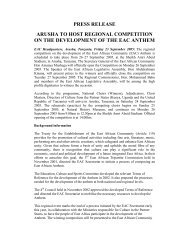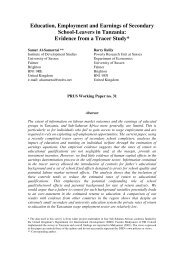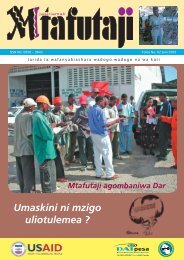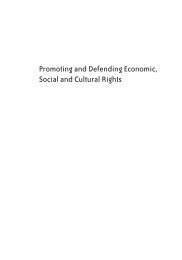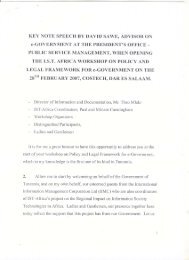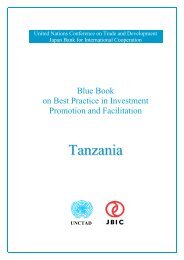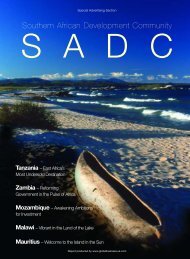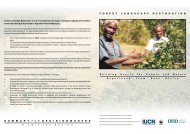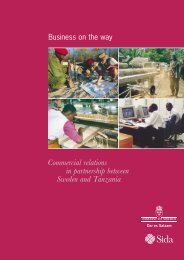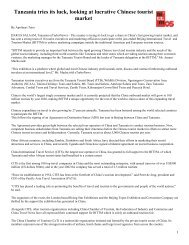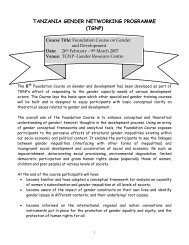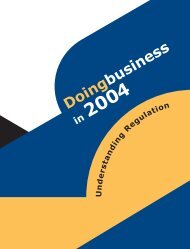The Girl-Child and Government Service Provision.pdf - Tanzania ...
The Girl-Child and Government Service Provision.pdf - Tanzania ...
The Girl-Child and Government Service Provision.pdf - Tanzania ...
- No tags were found...
Create successful ePaper yourself
Turn your PDF publications into a flip-book with our unique Google optimized e-Paper software.
provisions. Presently, Bank support for empowering thepoor remains incomplete. For example, the reportrecognises that “freedom from illness <strong>and</strong> freedom fromilliteracy” are important for the poor to escape poverty,but it fails to identify freedom from oppression <strong>and</strong> abuse.One can be healthy <strong>and</strong> educated but still be poor if governments,institutions <strong>and</strong> rules are not there to protect<strong>and</strong> to offer economic, social <strong>and</strong> political opportunities.Amartya Sen points out that the holistic approach to freedomdoes not include only health <strong>and</strong> education but also“freedoms [that] depend also on other determinants suchas social <strong>and</strong> economic arrangements as well as political<strong>and</strong> civil rights” (for example, the liberty to participate inpublic discussion <strong>and</strong> scrutiny). 7 This freedom to participatecan only be realized if those who hold the powerprovide the means for citizens to have access to both information<strong>and</strong> development decision-making; governments<strong>and</strong> development institutions such as the WorldBank have special roles in ensuring that the poor receiveprotection while advocating for their rights in all dimensions(economics, social <strong>and</strong> political). <strong>The</strong> brilliance of theWDR 2004 is overshadowed by the missing component,which leaves a large <strong>and</strong> hollow space that begs forcompletion <strong>and</strong> clear conclusions. In order to fill the gapsin meeting the basic service needs of the poor, the Bank<strong>and</strong> other multilateral institutions (the United Nations,IMF, World Trade Organization, etc.) should seek for coherencein their approach to financing development. Forinstance, empowerment of the poor economically must beaccompanied by working with governments to discussopenly the rights of some oppressed citizens. <strong>Government</strong>sthat advocate economic development <strong>and</strong> strengtheningthe national <strong>and</strong> global economy should find everyopportunity to address how voices of the poor can beheard at all levels. <strong>The</strong> World Bank, as one of the leadinglenders to poor countries’ governments, has an opportunityto demonstrate leadership by endorsing recommendationsput forward by reports such as the EIR, as well asto take the WDR 2004 one step further in acknowledgingthat poor clients need more than money to empowerthem; they also need political security to voice their concernswithout fear of persecution.If the WDR 2004 were to argue sufficiently for empowermentof the poor, it would have to question the currentpolitical system. It would address the deeper institutionalreform that is necessary to make services work for thepoor, not just separating public services from the responsibilityof the government. What are the political implicationsfor an institution like the Bank to work with governmentson improving the rights of their citizens? Would the Bankthen work closer with its client countries to coordinateprogrammes that better empower the poor? Would theBank consistently review its lending operations to ensurethat all funding support to projects <strong>and</strong> programmes reinforcesits belief in holistic empowerment of the poor?<strong>The</strong>se are important questions of power relations thatneed to be addressed when we seek to empower thepoor vis-à-vis the current situation of power imbalances.<strong>The</strong> role of governmentWhile the WDR 2004 has in-depth analysis of the powerrelations, it does not do enough to support the citizen’sconnections to his or her government. In describing thefailure of public services, the WDR 2004 proposes a newparadigm of decentralisation while admitting thatdecentralisation usually produces mixed results. <strong>The</strong> reportalso makes circular argument for reducing the role ofthe government while at the same time strengthening itsregulatory power. For example, in the discussion of makingdecentralisation work (chapter 10), the central government’srole is described as essential to success ofdecentralisation: “Decentralization fails or succeeds in theinterplay of its fiscal, administrative, <strong>and</strong> local capacity features.<strong>The</strong> centre’s role is crucial to all three elements <strong>and</strong>,more broadly, for the design <strong>and</strong> implementation of decentralization.”Another statement that demonstrates thetautological argument of the solution proposed by theWDR 2004 concludes: “Ultimately, the centre is both theregulator <strong>and</strong> the facilitator of decentralization.” In asense, the central government must learn to phase itselfout <strong>and</strong> at the same time be present <strong>and</strong> strong in orderto regulate <strong>and</strong> facilitate. <strong>The</strong> challenges in such a transitionoften lead to a budget cut, usually in the soft or socialsectors. 8 <strong>The</strong>re was no discussion on solutions; the WDR2004 offered choices to governments <strong>and</strong> cited good examplesof how public services can work throughprivatisation.<strong>The</strong> WDR 2004 suggests removing the responsibility forservices provision from the government by introducingthe market approach. Argument for liberalizing the traditionallypublic-sector goods away from the governmentfails to recognise that water, electricity, health <strong>and</strong> educationfall into areas of natural monopoly <strong>and</strong> public goods.<strong>The</strong> high entry fees to businesses <strong>and</strong> efficiency gains from82 <strong>The</strong> <strong>Girl</strong>-<strong>Child</strong> <strong>and</strong> <strong>Government</strong> <strong>Service</strong> <strong>Provision</strong>



